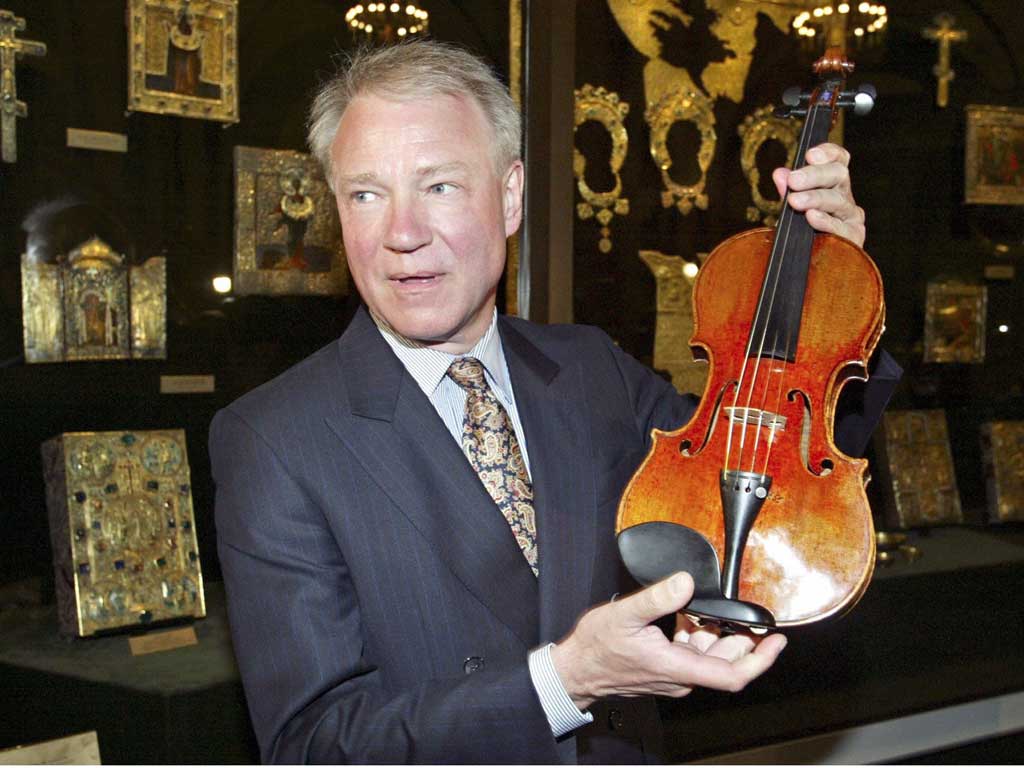The Great Stradivarius Fiddle
An expert on violins faces trial, charged with dealing in fake instruments

A piece of wood hewn from an Alpine fir is among the evidence that has led a renowned collector and authority on rare instruments to be labelled a con man, suspected of masterminding the world's biggest violin scam.
In April last year, suspicious bank officials in the German port city of Bremen called in a forestry expert to examine two legendary Stradivarius violins they had only recently been given as collateral for a €5.9m(£4.7m) loan. The instruments, said to have been created by the famed 17th- and early 18th-century Italian violin-maker, were supposedly 294 and 325 years old respectively. They had been given a combined value €5.2m – easily enough to cover the bank's loan.
But when Hamburg tree expert Micha Beuting subjected the pine board used to construct the instruments to a scientific "age test", he discovered they could not possibly be genuine Strads. The growth rings in the wood showed that the trees used to build the instruments were cut down decades after Antonio Stradivari died in 1737. The pair of violins that the bank had been holding in its safe proved to be worth a mere €2,000 each.
Violin expert Roger Hargrave, called into Bremen's Sparkasse bank to examine the instruments, said: "The bankers were completely shocked. There was no oxygen left in the room. They were extremely embarrassed to have fallen for such a huge trick."
The man now accused of perpetrating violin fraud on an epic scale over decades is German businessman and entrepreneur Dietmar Machold, a wealthy and internationally known collector and purveyor of rare violins.
Friends, business partners and acquaintances across the globe had nicknamed him "Mr Stradivarius".
Machold once had offices in Chicago, New York, Tokyo, Seoul, Zurich and Vienna. He drove a yellow Rolls-Royce, lived in a sumptuous 700-year-old castle in the country outside Vienna and played the role of celebrity businessman and society host. Austria felt sufficiently honoured by the fact that the Bremen-born businessman had decided to make the country his home that it awarded him the title of honorary professor.
Sixty-two year-old Machold is currently in an Austrian prison awaiting trial on charges of embezzlement, bankruptcy, and the offence of grand commercial fraud. He is suspected of swindling creditors out of €100m with the help of faked and real Stradivarius violins.
Vienna prosecutors have received 46 complaints relating to criminal charges against Machold, from banks and individuals in Australia, Holland, Germany, Belgium and the United States. The complainants include the owners of more than 200 string instruments which have passed through Machold's hands at some stage.
Prosecutors are piecing together evidence that alleges that Machold's business activities eventually degenerated into a giant game of bluff. Banks and collectors of luxury items such as rare violins were systematically conned out of millions in cash or their priceless instruments.
There are an estimated 600 Stradivarius violins, 60 cellos and 12 violas still in existence. Many of these instruments had been handled by Machold. As a dealer, he benefited enormously from the fact that Stradivarius-made and other historic instruments have became rare collector items.
Machold's career as a collector and dealer in priceless violins was initially hugely successful, but in 2010 his company collapsed, and the true nature of his later fraudulent dealings began to emerge. Using faked Strads and occasionally genuine instruments, he used his reputation to persuade creditors to hand him huge amounts of collateral. But the cash was been used increasingly to pay off a growing mountain of debts. In the end, Machold was trapped in a spiral of deception, prosecutors claim.
He has told Austrian prosecutors that he often duplicated violin certificates to trick the banks into lending him money. In other cases, he is alleged to have simply made off with his clients' precious instruments.
The Austrian prosecutor leading the case against him says Machold has "the gift of persuasiveness, accompanied by self-confidence and charm". Mr Stradivarius will need all those qualities when his trial opens next month.
A musical drama for the violin
Stradivarius violins are among the most sought-after instruments in the world. Antonio Stradivari was a 17th-century Italian luthier commissioned by King James II of England and King Charles III of Spain. It is believed that about 650 of the 1,000 instruments he made still survive. In 2011, a Stradivarius violin set a record after selling for £9.8m – the "Lady Blunt", named after its 19th-century owner Lady Anne Blunt, who was Lord Byron's granddaughter.
A £1.2m example was crushed when its owner slipped in the rain. Violinist Min-Jin Kym lost a £1.2m Stradivarius she had on long-term loan when she put it down to buy a sandwich at a London station. Its thief then tried to sell the violin for £100 to a stranger in a café.
In Berlin in 1921, a German merchant claimed that the ghost of Stradivari told him the secret of how to transform a normal violin into an acclaimed Stradivarius. He played a concert to musicians, critics and artists who were asked to distinguish between his "revealed 'Stradivarius' violins" and the actual Stradivarius. No one could tell the difference.
Emma Seddon
Join our commenting forum
Join thought-provoking conversations, follow other Independent readers and see their replies
Comments
Bookmark popover
Removed from bookmarks